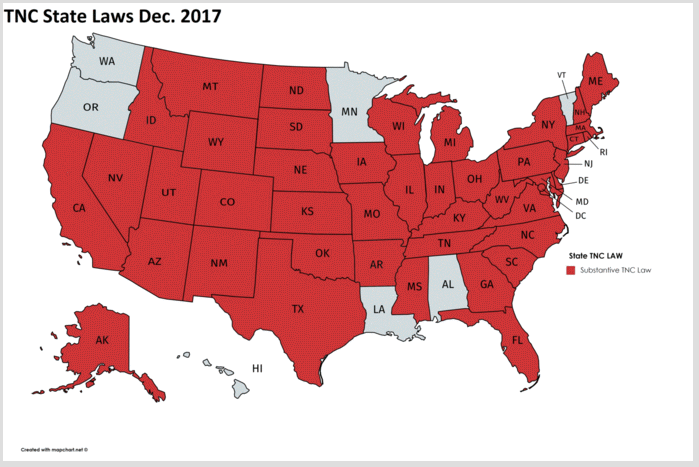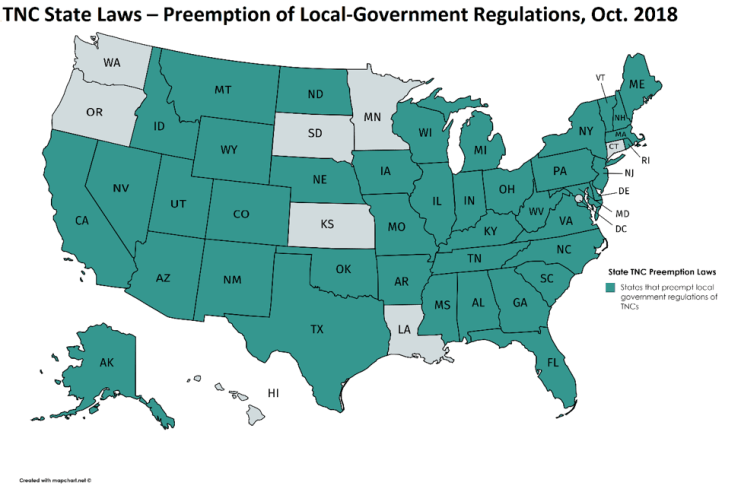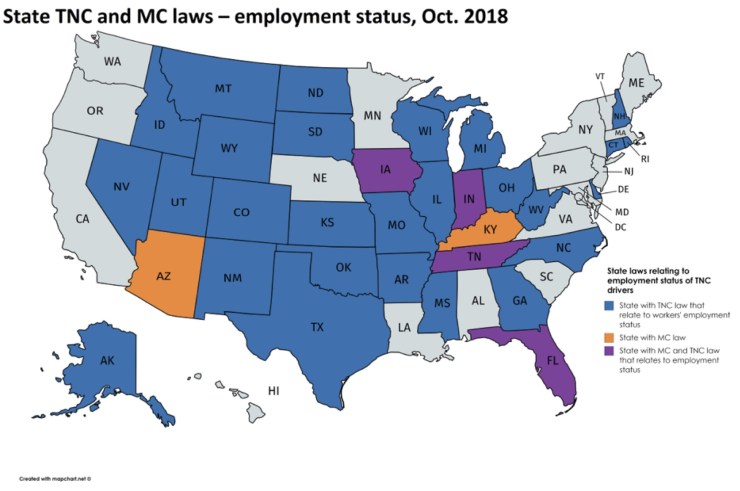As covered here before, in the past four years all states but one have passed ‘Uber laws’ that regulate Transportation Network Companies, or TNCs, and 6 states passed Marketplace Contractor (MC) laws that regulate platform workers. This post will survey the current state of affairs in state TNC and MC legislation, focusing on two of the most debated issues, preemption of local government regulations (relevant for TNCs) and treatment of employment status of TNC drivers (covered by both TNC and MC legislation). The summary of the data and sources used for this post, which is part of an ongoing project on TNCs, labor, and federalism, is available here.
Forty-five states have passed TNC laws with substantive terms that are not limited to insurance requirements. The rapid spread of those laws across the US over the last four years can be seen on this map:

The TNC laws of 42 states preempt local government regulations of TNCs, shifting the regulatory landscape and political battleground of TNC regulations from cities to states. These preemption sections usually exempt airports (and in the case of Texas, “cruise ship terminals”) and local regulations of traffic and parking. A few laws offer exemption from preemption to large cities (NY for example); in a few others, cities are authorized to ban TNCs, but not to regulate them in any other way.
An interesting twist is offered by Illinois’ TNC law which sets a ‘floor preemption’, stating:
Sec. 32. Preemption.
A unit of local government… …may not regulate transportation network companies, transportation network company drivers… in a manner that is less restrictive than the regulation by the State under this Act…
The vast coverage of TNC preemption laws can be appreciated from this map:

32 states passed TNC legislation that treats the employment status of TNC drivers, usually in a way that reinforces their status as independent contractors. All other TNC laws are silent on that matter, except for Maine’s, which states explicitly that the TNC law does not apply to workers’ comp. claims.
The treatment of employment status varies. The most straightforward approach is simply stating that TNC drivers are not employees, like the one offered by the Utah code:
13-51-103. Exemptions — Transportation network company and transportation network driver.
…
(2) A transportation network driver is:
(a) an independent contractor of a transportation network company; and
(b) not an employee of a transportation network company.
The more nuanced and common approach is by setting a presumption that drivers are independent contractors, given that some conditions are met, where the same four or five conditions are usually mentioned. The 2016 West Virginia law might be a good example of those, while Florida’s TNC law offers the 4 conditions model.
North Carolina also offers an independent contractor presumption, but one that is rebutted by application of the common law test. Speaking of, the other common treatment of employment status is by declaring that TNCs do not control their drivers, weighing in on common law test analysis of employment status. An excerpt of the North Dakota law might help illustrate the point:
A transportation network company may not be deemed to control, direct, or manage the personal vehicles or participating drivers that connect to the transportation network company’s online-enabled application or platform, unless agreed to by written contract.
In 2017-8, 7 States (Arizona, Florida, Indiana, Iowa, Kentucky, Tennessee, and Utah) have passed MC laws that carve out platform workers from state employment regulations. As covered by the National Employment Project, these laws have a relatively uniform and broad language covering workers that provide services to third parties through websites or apps (with the exception of Utah – covering ‘building service contractors’ only). MC laws also use a presumption of independent-contractor status, conditioned on similar set of terms like the TNC legislation, see the Arizona MC law for example. Note the scheduling caveat under subsection 3(c), allowing MCs and workers to agree on a specific schedule, limiting the flexibility workers usually enjoy in platform work.
The specific language used in all 32 TNC laws that relate to employment status, and examples for the language used in MC laws, is specified here. The map of states that passed TNC and MC legislation that relates to employment status can be seen here:

These laws drastically changed the regulatory structure of TNCs, and substantively narrowed the ambiguity regarding the employment status of drivers. What was once a disruptive, ‘easier to ask forgiveness than it is to get permission’, type of business, have institutionalized its interests in state law. As Ben and Sharon mentioned here, and despite the labor-related triumphs in NYC, the promise of Seattle, and the potential in Cal., this process reminds us of “how much the diminished power of the labor movement has undermined workers’ ability to counter well-organized and financed anti-worker political interests”. These maps, and the one relating to employment status in particular, might be a rough proxy for such power.
For comments, questions, and suggestions, contact the author at gracabi@law.harvard.edu. Thanks to Becky Smith and Maya Pinto of the National Employment Law Project for their valuable input in the making of this post. Summary of the data used to make this post is available here.
Other relevant sources:
Owain James, “Uber and Lyft are Lobbying States to Prohibit Local Regulation”, Mobility Lab (Jul. 2018) (Link).
Elizabeth J. Kennedy, Employed by an Algorithm: Labor Rights in the On-Demand Economy, 40 Seattle U. L. Rev. 987, 1037 (2017) (Link).
Sarah E. Light, Precautionary Federalism and the Sharing Economy, 66 Emory L.J. 333, 378 (2017) (SSRN).
Rebecca Smith et. al, “Uber State Interference: How Transportation Network Companies Buy, Bully and Bamboozle Their Way To Deregulation”, National Employment Law Project (Jan. 2018) (Link).
Rebecca Smith, “’Marketplace Platforms’ and ‘Employers’ Under State Law – Why We Should Reject Corporate Solutions and Support Worker-Led Innovation”, National Employment Law Project (May 2018) (link).
Texas A&M University, Transportation Network Company (TNC) Legislation Map (Link).
National League of Cities, “City Rights in an Era of Preemption: A State-by-State Analysis” (Apr. 2018) (Link).


Spread the word